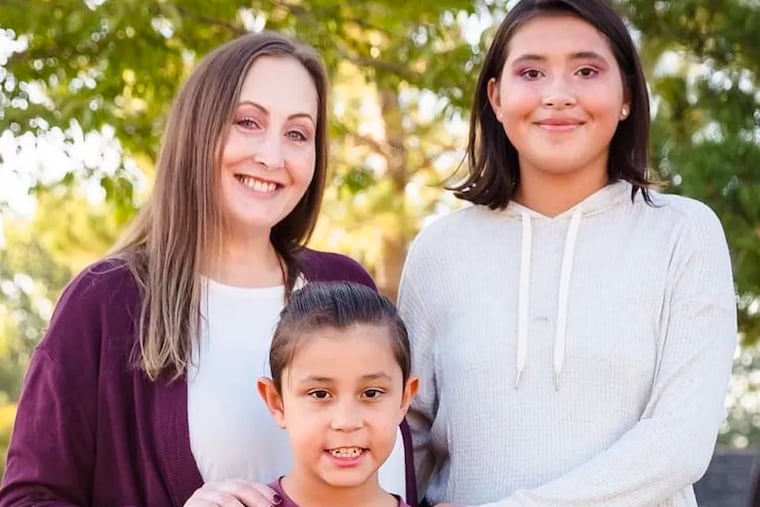I’m dying. Bankruptcy laws are preventing my family from getting what they deserve
I developed cancer from Johnson & Johnson's baby powder, now the company is barring victims like me from exercising our constitutional right to argue our lawsuit in front of a jury.

A few months ago, I received the worst news of my life.
At the time, the dreams I had worked so hard to achieve were finally becoming a reality. I purchased my first “forever” home to give my children the stability I never experienced growing up. I landed my dream job as an addiction counselor. My future seemed bright.
Then I felt a pain in my side.
The next week I was diagnosed with terminal cancer. I was given 12-16 months to live, which puts my expiration date at March of 2023, one month before my 50th birthday.
Mesothelioma is a rare and terminal form of cancer caused by one thing only: exposure to asbestos.
I never worked with asbestos or had any other occupational exposures. After spending hours going over every place I’ve ever lived or worked, it was determined that the only way I was exposed to asbestos was from Johnson & Johnson’s Baby Powder, which I used for years when my children were babies. The little white bottle I had associated with motherly love, hygiene, and care became my death sentence.
After my diagnosis, I began aggressive treatment, which made it impossible to keep my job. Without my income, I was forced to sell my family’s new home.
A paramount concern of mine was how I would ensure the financial security and well-being of my children once I was not alive to provide for them. How I would care for my 14-year-old daughter Angelica, who has been diagnosed with autism, and my son Jayce, who is only 9 years old, kept me up at night and unnerved me during the day. When I found out I could seek compensation from Johnson & Johnson for my damages and have my case decided by a jury as guaranteed by the Seventh Amendment, I felt determined to use my constitutional right to take care of my family.
That’s when I got another batch of bad news. I was told that Johnson & Johnson — a company I understand to be worth over $400 billion — managed to put my claim in bankruptcy, pausing my case indefinitely as the timer on my life continued to tick away. The scheme Johnson & Johnson used to avoid paying my family and hundreds of thousands of other families, otherwise known as the “Texas Two-Step,” involves wealthy corporations utilizing a loophole in Texas law to transfer expensive liabilities, such as class-action lawsuits, onto a shell company. The shell company then files for bankruptcy, so any compensation would come out of a trust fund for victims, not settled in court, where juries could order much higher amounts.
» READ MORE: Don’t overhaul the U.S. bankruptcy system
Johnson & Johnson is barring victims from exercising their constitutional right to be heard in the court of law and be assessed by a jury. They are essentially taking the decision of how to repair damages to victims out of the hands of everyday Americans who would form part of the jury. I ask myself whether Johnson & Johnson does not trust the American people to choose right from wrong.
My court date was never announced, because it never will be, at least not while I am alive.
So everything stopped, except my cancer, which keeps marching on. I had a living memorial so my friends and family could say goodbye; I gave them all parting gifts of a wallet-sized poem titled “Don’t Quit.”
I’m not ready to quit yet. I constantly think about other families like mine who now no longer have a way to fight.
“I’m not ready to quit yet.”
The committees that represent us have appealed a previous decision — which green-lit J&J’s use of the Texas two-step to avoid paying victims — to the 3rd District U.S. Appeals Court in Philadelphia and expect the case will be argued in late summer or early fall.
Some supporters of the Texas two-step have argued that it is rarely used and avoids jackpot jury awards that make trial lawyers rich while putting a company out of business. It makes litigation more fair, they say.
I’m dying, and may not get my constitutional right to a day in court. How is that fair?
Companies like Johnson & Johnson use the Texas two-step to run out the clock on dying people like me and corrupt our legal system just to protect their bottom line. For the sake of living and future victims of asbestos exposure and their families, I urge Congress to take immediate action to end the vile practice that is the Texas two-step, and hold Johnson & Johnson accountable.
Kimberly Naranjo is one of thousands of plaintiffs who have filed an appeal against Johnson & Johnson’s use of the Texas two-step. The case currently sits in the 3rd District U.S. Appeals Court in Philadelphia.